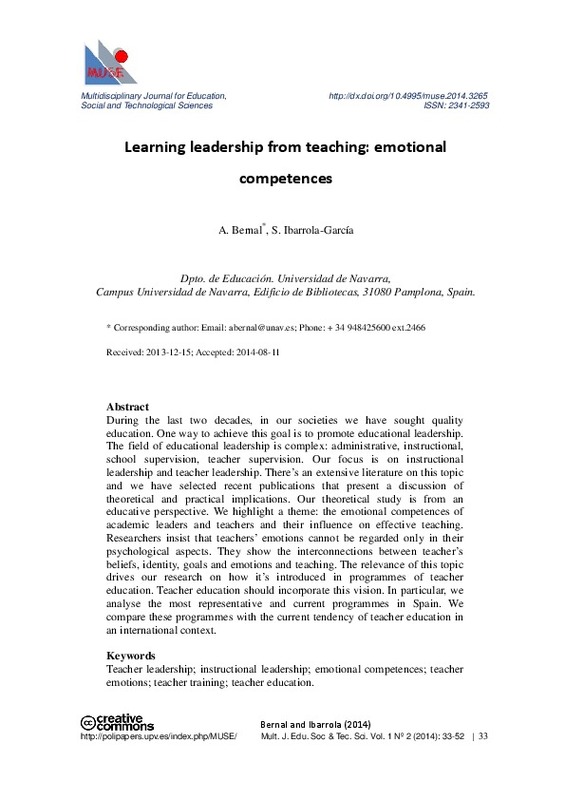JavaScript is disabled for your browser. Some features of this site may not work without it.
Buscar en RiuNet
Listar
Mi cuenta
Estadísticas
Ayuda RiuNet
Admin. UPV
Learning leadership from teaching: emotional competences
Mostrar el registro sencillo del ítem
Ficheros en el ítem
| dc.contributor.author | Bernal, A.
|
es_ES |
| dc.contributor.author | Ibarrola-García, S.
|
es_ES |
| dc.date.accessioned | 2014-11-25T11:00:27Z | |
| dc.date.available | 2014-11-25T11:00:27Z | |
| dc.date.issued | 2014-09-18 | |
| dc.identifier.uri | http://hdl.handle.net/10251/44800 | |
| dc.description.abstract | [EN] During the last two decades, in our societies we have sought quality education. One way to achieve this goal is to promote educational leadership. The field of educational leadership is complex: administrative, instructional, school supervision, teacher supervision. Our focus is on instructional leadership and teacher leadership. There’s an extensive literature on this topic and we have selected recent publications that present a discussion of theoretical and practical implications. Our theoretical study is from an educative perspective. We highlight a theme: the emotional competences of academic leaders and teachers and their influence on effective teaching. Researchers insist that teachers’ emotions cannot be regarded only in their psychological aspects. They show the interconnections between teacher’s beliefs, identity, goals and emotions and teaching. The relevance of this topic drives our research on how it’s introduced in programmes of teacher education. Teacher education should incorporate this vision. In particular, we analyse the most representative and current programmes in Spain. We compare these programmes with the current tendency of teacher education in an international context. | es_ES |
| dc.language | Inglés | es_ES |
| dc.publisher | Editorial Universitat Politècnica de València | |
| dc.relation.ispartof | Multidisciplinary Journal for Education, Social and Technological Sciences | |
| dc.rights | Reconocimiento - No comercial - Sin obra derivada (by-nc-nd) | es_ES |
| dc.subject | Teacher leadership | es_ES |
| dc.subject | Instructional leadership | es_ES |
| dc.subject | Emotional competences | es_ES |
| dc.subject | Teacher emotions | es_ES |
| dc.subject | Teacher training | es_ES |
| dc.subject | Teacher education | es_ES |
| dc.title | Learning leadership from teaching: emotional competences | es_ES |
| dc.type | Artículo | es_ES |
| dc.date.updated | 2014-11-24T16:35:42Z | |
| dc.identifier.doi | 10.4995/muse.2014.3265 | |
| dc.rights.accessRights | Abierto | es_ES |
| dc.description.bibliographicCitation | Bernal, A.; Ibarrola-García, S. (2014). Learning leadership from teaching: emotional competences. Multidisciplinary Journal for Education, Social and Technological Sciences. 1(2):33-52. https://doi.org/10.4995/muse.2014.3265 | es_ES |
| dc.description.accrualMethod | SWORD | es_ES |
| dc.relation.publisherversion | https://doi.org/10.4995/muse.2014.3265 | es_ES |
| dc.description.upvformatpinicio | 33 | es_ES |
| dc.description.upvformatpfin | 52 | es_ES |
| dc.type.version | info:eu-repo/semantics/publishedVersion | es_ES |
| dc.description.volume | 1 | |
| dc.description.issue | 2 | |
| dc.identifier.eissn | 2341-2593 | |
| dc.description.references | Bisquerra Alzina, R., & Pérez Escoda, N. (2007). Las competencias emocionales. Educación XX1, 10(0). doi:10.5944/educxx1.1.10.297 | es_ES |
| dc.description.references | Brackett, M.A. and Katulak, N.A. (2006). "Emotional intelligence in the classroom: Skill based training for teachers and students". En J. Ciarrochi y J.D. Mayer (Eds.), Improving emotional intelligence: A practitioner's guide (pp.1-27). New York: Psychology Press Taylor y Francis. | es_ES |
| dc.description.references | Day, C. (2012). New Lives of teachers. Teacher Education Quarterly, 39(1), 7–26. | es_ES |
| dc.description.references | Denzin, N. M. (2009). Foreword: Performance, Pedagogy and Emotionality. In P. A Schutz and M. Zembylas (Ed.), Advances in Teacher Emotion Research: The Impact on Teachers' Lives, (pp. VI–VII). Boston: Springer. | es_ES |
| dc.description.references | Fredickson, B.L. (2004). The broaden-and-build theory of positive emotions. The Royal Society, 359(1449), 1367-1377. | es_ES |
| dc.description.references | Lieberman, A., & Friedrich, L. (2010). Teacher Leadership: Developing the Conditions for Learning, Support, and Sustainability. Second International Handbook of Educational Change, 647-667. doi:10.1007/978-90-481-2660-6_37 | es_ES |
| dc.description.references | Marchesi, A. (2007) Sobre el bienestar de los docentes. Madrid, Alianza Editorial. | es_ES |
| dc.description.references | Mayer, J.D. & Salovey, P. (1997). What is emotional intelligence? En P. Salovey y D. Sluyter (Eds.). Emotional development and emotional intelligence: implications for educators (pp.3-31). New York: Basic Books. | es_ES |
| dc.description.references | Mu-oz, M. (2005). Prevención del estrés psicosocial del profesorado mediante el desarrollo de competencias emocionales: el programa PECERA. Revista Interuniversitaria de Formación del Profesorado, 19(3), 115-136. | es_ES |
| dc.description.references | Pérez-Escoda, N., Filella, G., Bisquerra, R. and Alegre, A. (2012). Desarrollo de la competencia emocional de maestros y alumnos en contextos escolares. Electronic Journal of Research in Educational Psychology, 10(3), 1183-1208. | es_ES |
| dc.description.references | Pérez-Escoda, N., Filella, G., Soldevila, A., and Fondevila, A. (2013). Evaluación de un programa de educación emocional para profesorado de primaria. Educación XXI, 16(1), 233-254. | es_ES |
| dc.description.references | Vaello Orts, J. (2009) El profesor emocionalmente competente. Un puente sobre aulas turbulentas. Barcelona, Grao. | es_ES |
| dc.description.references | Van Veen, K. y Lasky, S. (eds.) (2005) Emotions, teacher identity and change, Emotions, teacher identity and change (Monográfico). Teaching and Teacher Education, 21 (8), 995–1006. | es_ES |








